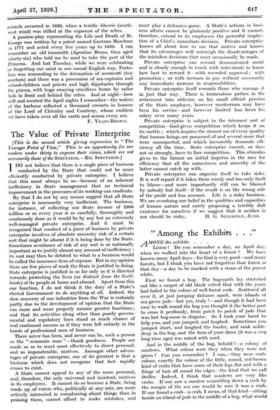The Value of Private Enterprise
[This is the second article giving expression to " The Younger. Point of View," This is an opportunity for our readers under thirty to express their views, which are not necessarily those of the SPECTATOR.—ED. SPECTATOR.] 1 DO not believe that there is a single piece of business conducted by the State that could not be more efficiently conducted by private enterprise. I believe that this must always be so—because of an inherent inefficiency . in State management that no technical improvement in the processes of its working can eradicate.
By that I do not by any means suggest that all State enterprise is necessarily very inefficient. The business, for instance, of collecting our State income of £800 million or so every year is as carefully, thoroughly and courteously done as it would be by any but an extremely well-managed private enterprise.. And it must be recognized that conduct of a piece of business by private enterprise involves of absolute necessity risk of a certain sort that might be absent if it is being done by the State. Sometimes avoidance of risk of any sort is so nationally important as to justify almost any amount Of inefficiency : its cost may then be debited to what in a business would be called the insurance item of expense. But in my opinion there are few pieces of work the State is justified in doing. State enterprise is justified in so far only as it is directed towards piotecting the lives (as distinct from the liveli- hoods) of its people at home and abroad. Apart from this one function, I do not think it the duty of a State's elected Government to do anything at all. .Indeed, the slow recovery of our industries from the War is certainly partly due to the 'development of opinion that the State can more and more properly assume greater functions ; and that its activities along other than purely govern- mental and regulatory lines stand as much chance of real continued success as if they were left entirely in the hands of professional, men of business.
There never has been, and never can be, such a person as the economic man "—thank goodness. People are made so as to react most effectively to direct personal, and so imponderable, motives. Amongst other advan- tages of private enterprise, one of its greatest is that a business which does not recognize that fact rapidly ceases to exist.
A State cannot appeal to any of the more personal, and, therefore, the only universal and insistent, motives in its employees. . It cannot do so because a State, being made, up of voters _who, politically at any rate, are more actively interested in complaining about things than in praising them, cannot afford to make mistakes, and must play a defensive.game. A State's actions in busi- ness affairs cannot be gloriously positive and it cannot, therefore,, extend to its employees the powerful inspira- tion of a Chief's immediate decision. Private enterprise knows all about how to use that motive and knows that _its advantages well outweigh the disadvantages of the mistaken decisions that must occasionally be made. Private enterprise can reward demonstrated merit and is closely enough in touch with individuals to know how best to reward it—with recorded approval; with promotion ; or with increase in pay without necessarily any immediate increase in responsibilities.
Private enterprise itself rewards those who manage it in just that way. There is tremendous pathos in the retirement into oblivion on his small official pension of the State employee, however meritorious may have been his service—and however limited has been his salary over many years.
Private enterprise is subject to the intensest sort of competition—God-given competition which keeps it on its mettle ; which inspires the utmost use of every quality that human beings are possessed of and several more that were unsuspected, and which inexorably demands effi- ciency all the time. State enterprise cannot, or does not so strongly, have to face competition. This stimulus gives to the former an initial impetus in the race for efficiency that all the earnestness and sincerity of the latter cannot catch up with.
Private enterprise can organize itself to take risks. It is well repaid if it takes them wisely and has only itself to blame—and more importantly still can be blamed by nobody but itself—if the result is on the wrong side of the profit and loss account. Life is a risky business. We are overdoing our belief in the qualities and capacities of human nature and surely proposing a terribly dull existence for ourselves if we suggest that it neither is








































 Previous page
Previous page